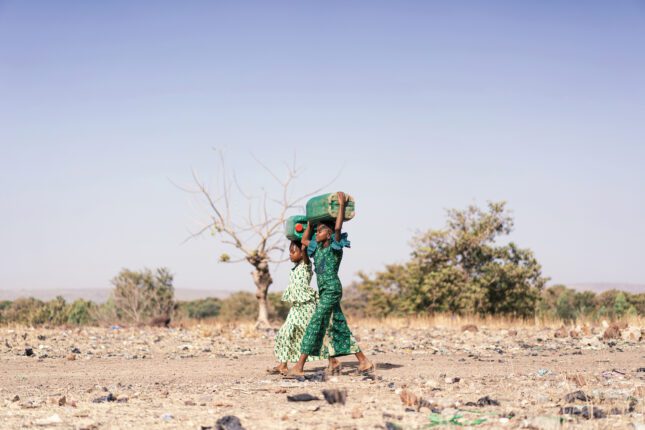-
Economic and Political Fragility and Insecurity: A Climate Triple Threat in South Sudan
September 3, 2025 By Rachel Stromsta
Climate-related catastrophes are posing significant challenges in already-fragile South Sudan. When record-breaking floods again swept across the country in mid-2024, for instance, the disaster affected 1.4 million people, with the cumulative years of flooding submerging two-thirds of the country.
Among the most vulnerable countries in the world to climate change, South Sudan’s crisis is only expected to worsen, as the country lacks the requisite infrastructure to respond to the pressing dangers. South Sudan is already experiencing more extreme climate events, droughts and floods, along with increasingly erratic rainfall and rising temperatures.
Oil production is a particular nexus for these factors. And as the ongoing threat of severe floods returning in 2025 looms, South Sudan is at a critical juncture. How it copes with the economic, political, and regional security implications created by another climate-related crisis will have effects that extend beyond its own borders.
A Connection Between Climate and the Economy
The combined factors of climate and a lack of infrastructure seem certain to play havoc with the nation’s economy. Already there is injury to agricultural livelihoods through resource shortages, including large-scale damage to crops. Since agriculture is the main livelihood for 80% of households in South Sudan, its economic importance cannot be overstated.
Livestock losses from climate change worsen intercommunal rivalries, and increase competition over grazing land and water between pastoralists and farmers. This situation raises the risk of cattle raiding, often leading to retaliatory attacks and clashes, especially in drought-prone areas. Climate events also force herders to migrate in search of higher ground, further heightening the chance of conflict with new host communities and deepening existing tensions.
These local economic dynamics contribute to the broader growth of rivalries and armed groups fighting for control over vital resources. It is a cycle of conflict and climate disruptions which continues to deplete communities’ coping mechanisms and resources, and hampers critical economic recovery and fueling ongoing violence and insecurity.
The country’s drought-induced food shortages also can lead to higher prices and increased inflation, further destabilizing the economy in these key areas.
Oil Issues Pose a Threat to the Status Quo
South Sudan’s fragile economy relies heavily on its oil industry, which accounts for over 90% of its revenue and most of the country’s exports. This dependency makes the country particularly vulnerable to disruptions driven by both climate events and ongoing political insecurity.

Source: North Africa Post South Sudan’s Northern Unity and Upper Nile states, which contain its major oil fields, have been especially hard hit by climate-related events. Floods threaten critical infrastructure here, including pipelines, wells, and access roads, while oil spills from these facilities can not only further threaten health and safety but also contaminate arable land. Rising temperatures and prolonged water scarcity also cause heightened resource shortages, which can delay maintenance and repairs and pose complications for oil operations.
Pipeline ruptures and closures have also caused drastic drops in oil exports, directly impacting South Sudan’s economy. In February 2024, a blockage of the main pipeline near Khartoum led to the loss of two-thirds of South Sudan’s revenue, deepening the economic crisis. The cause? Gelling occurred within the pipeline due to a lack of diesel needed to thin out crude oil.
As the local currency depreciated, salaries for civil servants and security forces remained unpaid, and the costs of both imported and domestically produced goods surged. This has inflicted profound hardships on ordinary civilians, deepening inequality and insecurity. Oil production has only recently resumed after a nearly year-long suspension.
The government maintains centralized control over oil revenues and often uses them to strengthen military and security forces. Despite this vast wealth, however, little money reaches citizens or funds vital services, thus perpetuating fragile economic conditions and inequality. Further lapses in oil production could collapse government revenue and threaten the deep-rooted political structure. Such disruptions carry significant risks of political and social destabilization, fueled by ongoing efforts by various groups to maintain or seize control of oil revenues.
Adding to the gravity of the climate-fueled oil disruption, South Sudan faces rising fears of a return to civil war, aggravated by escalating tension between President Salva Kiir and Vice President Riek Machar. Renewed hostilities also have broken out in the northeast between government troops and the White Army militia. These developments heighten concerns of widespread unrest, and any further escalation could shatter stability and worsen economic hardships.
The threat of violence and insecurity disrupts an already fragile economy and political system. In theory, further disruptions could create opportunities for reform toward more equitable power-sharing. Yet deeper insecurity in South Sudan remains a highly unpredictable situation. In the short term, certainly the risks now facing the country are more likely to cause increased poverty and violence, with civilians bearing the brunt of the fallout.
A Powder Keg for Regional Insecurity
Outside players also pose a challenge. South Sudan transports most of its oil through pipelines to ports in neighboring Sudan, which leaves the industry vulnerable to disruption from the Sudanese civil war. In May 2024, following drone strikes in Port Sudan launched by the Rapid Support Forces (RSF), the Sudanese government announced plans to halt oil exports to South Sudan, after the attacks damaged key facilities, including a critical pump station and fuel depot.
While South Sudan’s oil exports have since resumed, this event highlights how the instability in Sudan creates unpredictable regional dynamics that resonate beyond its borders. The critical pipeline runs through territories controlled by both the Sudanese Armed Forces and the RSF, raising concerns about potential damage. This vulnerability has manifested in clashes near border areas, such as the hostilities in Upper Nile.
Since Sudan also relies on these transit routes for its own economy, attacks on infrastructure such as the recent strikes in Port Sudan threaten to escalate regional tensions into wider conflict. This shared border amplifies risk, and increases the potential for instability to spread back into South Sudan.
Of course, if South Sudan were to descend into renewed conflict, the resulting violence could worsen Sudan’s ongoing humanitarian crisis, with significant consequences for both nations. These interconnected issues create a tense flashpoint with the potential to ignite broader instability or merge conflicts across the region.
Addressing the Triple Threat
South Sudan needs coordinated action to address these mounting challenges, among the key measures that must be taken include the implementation of early warning systems to anticipate interconnected crises of climate and insecurity, as well as diversifying the country’s economy beyond oil to reduce its vulnerability to regional dynamics. Strengthening regional cooperation with Sudan and neighboring countries also is vital to securing transit routes and preventing the escalation of conflicts that threaten broader stability.
Conflict prevention and resolution initiatives that integrate climate, economic, and political factors are essential to breaking South Sudan’s cycle of violence and reducing regional tensions. Doing so can lay the foundation for a more stable and equitable future.
Rachel Stromsta is a Rising Expert for Africa with the Young Professionals in Foreign Policy (YPFP). Previously, she has served as an International Protection Officer with the Nonviolent Peaceforce in South Sudan. She holds a Bachelor of Arts in Political Science, with a concentration in Human Rights and Humanitarianism, from Macalester College.
Sources: ACLED; Al Jazeera; AP; BBC; Bloomberg; CFR; Climate Diplomacy; DW; The Economist; European Commission; IRC; New York Times; NUPI; PAX; Radio Tamazuj; SIPRI; Sudan Tribune; UN; UNICEF; UNDP; UNOCHA; World Bank; World Economic Forum
Photo Credits: Licensed by Adobe Stock.
Topics: agriculture, climate, climate change, environmental security, meta, oil, South Sudan, Sudan, water
 A Publication of the Stimson Center.
A Publication of the Stimson Center.








